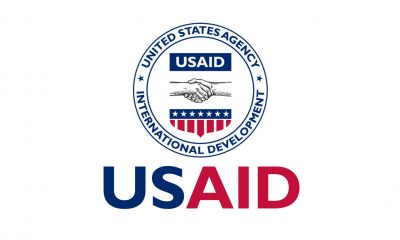Health
UNFPA Wants FG To Check High Fertility, Maternal Mortality

The United Nations Population Fund (UNFPA) last Monday advised Nigeria to fight high fertility, maternal mortality rate and migration problem to end poverty and boost prosperity in the country.
The UNFPA Country Representative, Ms Diene Keita, gave the advice at the 5th Annual Population Lecture Series (APLS) with the theme: “Achieving Demographic Dividend: Strategic Tool for Economic Recovery and Sustainable Development” in Abuja.
Represented by the Assistant Country Representative of UNFPA in Nigeria, Mr Osaretin Adonri, Keita said that if Nigeria wants to tackle poverty, enhance prosperity and promote sustainable growth as envisaged in Agenda 2030 for Sustainable Development, it was of prime necessity to address diverse population issues.
She said that problems including high fertility, high maternal mortality rate, migration and the special issue of youth development must be addressed.
“The theme of this year’s lecture is in line with the African Union Road Map on harnessing the Demographic Dividend through Investment in Youth and the country’s road map on harnessing Demographic Dividend through Investment in Youth launched in July, 2017.
“It is relevant to the Nigeria Economic Recovery and Growth Plan (2017-2020), which in recognition of the risk factor of the high population growth rate in Nigeria prescribed the integration of population dynamics in development programmes.
“With a large population of young people accounting for 31.7 per cent of the population, the country should urgently generate a large number of productive jobs for the growing working-age population.
“Also there is the need to adopt a strong social welfare system for the aged which will in the near future contribute substantially to the dependent population.
“The country must implement appropriate policies on small families, and capital inflow to grow the manufacturing bases and consumer markets, especially to support investment and employment growth in order to take advantage of its demographic situations for sustainable development,” she said.
However, the UN official lauded the federal government through the National Population Commission and other partners for their hard work, consistency and collaboration in ensuring the success of this year’s lecture.
She appealed to policy makers and programme managers to make the best use of knowledge about population issues at the APLS and similar opportunities for development planning; ensuring that policies and programmes were guided by data on population issues.
In her remarks, the Executive Director of Advocacy Nigeria, Hajiya Saudatu Sani, said that the time of planning on the management of Nigerian population was over and it was now time for implementation.
Sani also urged government to invest in the youth, women and girl child education to achieving demographic dividend.
The gender advocate advised the government to adopt the model used in China where there was huge investment on the youth for sustainable development.
“Nigeria must do that now, the time of planning is over, it is time to implement and government must do that now to fight poverty,” she said.
Health
‘How Micro RNA Research Won Nobel Prize’
Two United States scientists who unraveled the human micro RNA have won the Nobel Prize in Physiology or Medicine 2024.
Victor Ambros and Gary Ruvkun won the coveted prize for their work on microRNA as their discoveries help explain how complex life emerged on earth and how the human body is made up of a wide variety of different tissues.
MicroRNAs influence how genes – the instructions for life – are controlled inside organisms, including humans.
Every cell in the human body contains the same raw genetic information, locked in our DNA.
However, despite starting with the identical genetic information, the cells of the human body are wildly different in form and function.
The electrical impulses of nerve cells are distinct from the rhythmic beating of heart cells. The metabolic powerhouse that is a liver cell is distinct to a kidney cell, which filters urea out of the blood.
The light-sensing abilities of cells in the retina are different in skillset to white blood cells that produce antibodies to fight infection.
So much variety can arise from the same starting material because of gene expression.
The US scientists were the first to discover microRNAs and how they exerted control on how genes are expressed differently in different tissues.
The medicine and physiology prize winners are selected by the Nobel Assembly of Sweden’s Karolinska Institute.
They said: “Their groundbreaking discovery revealed a completely new principle of gene regulation that turned out to be essential for multicellular organisms, including humans.
“It is now known that the human genome codes for over 1,000 microRNAs.”
Health
WHO Begins Regulation On Antibiotic Waste
The World Health Organisation (WHO) has begun acting to curb effects of antibiotic pollution.
The new guidance on wastewater and solid waste management for antibiotic manufacturing sheds light on this important but neglected challenge ahead of the United Nations General Assembly (UNGA) High-Level Meeting on antimicrobial resistance (AMR) taking place on 26 September 2024.
The emergence and spread of AMR caused by antibiotic pollution could undermine the effectiveness of antibiotics globally, including the medicines produced at the manufacturing sites responsible for the pollution.
Despite high antibiotic pollution levels being widely documented, the issue is largely unregulated and quality assurance criteria typically do not address environmental emissions. In addition, once distributed, there is a lack of information provided to consumers on how to dispose of antibiotics when they are not used, for example, when they expire or when a course is finished but there is still antibiotic left over.
“Pharmaceutical waste from antibiotic manufacturing can facilitate the emergence of new drug-resistant bacteria, which can spread globally and threaten our health. Controlling pollution from antibiotic production contributes to keeping these life-saving medicines effective for everyone,” said Dr Yukiko Nakatani, WHO Assistant Director-General for AMR ad interim.
Globally, there is a lack of accessible information on the environmental damage caused by manufacturing of medicines.
“The guidance provides an independent and impartial scientific basis for regulators, procurers, inspectors, and industry themselves to include robust antibiotic pollution control in their standards,” said Dr Maria Neira, Director, Department of Environment, Climate Change and Health, WHO. “Critically, the strong focus on transparency will equip buyers, investors and the general public to make decisions that account for manufacturers’ efforts to control antibiotic pollution.”
Health
Kebbi Harmonises Doctors’ Salaries To Curb Brain Drain
In a concerted effort to curb brain drain, the Kebbi State Government has harmonised medical doctors’ salaries to be at par with their colleagues in the federal government’s tertiary health facilities.
Kebbi State Commissioner for Health, Musa Inusa-Isma’il, disclosed this at the handing over of ambulances to the state-owned health facilities at the Ministry of Health in Birnin Kebbi yesterday.
Inusa Isma’il, according to a statement by Ahmed Idris, the Chief Press Secretary to the governor, said the essence of the harmonisation was to retain the existing medical doctors and attract more to the services of the state.
According to him, the doctors across the state had already started enjoying the new salaries from August 2024.
He said the release of the vehicles was in fulfilment of Governor Nasir Idris’ promise to uplift health care services in the state.
“His Excellency said I should inform you, the beneficiaries of this gesture, that the vehicle should be strictly used for the intended purpose. It should not be used for anything else.
“If there is no referral case, each of the vehicles must be parked at the hospital by 6 pm. The governor said you should warn your drivers against reckless driving as well as violating the instructions.
“We should also do everything possible to reciprocate the gesture by working according to the terms and conditions attached,” he advised.
The benefiting health facilities included Sir Yahaya Memorial Hospital, Birnin Kebbi; State Teaching Hospital, Kalgo; General Hospital, Argungu; General Hospital, Yauri; General Hospital, Zuru; and General Hospital, Bunza.
In his speech, the permanent secretary of the ministry, Dr Shehu Koko, recalled that the ambulances were handed over to the ministry last Friday by the governor for the onward handover to the benefiting hospitals.
He observed that the ambulances would go a long way in improving the referral system in the state, adding that delays in reaching the secondary and tertiary facilities would be eliminated.
The permanent secretary attributed the high rate of maternal mortality in the country to delays in getting to the health facilities for proper medical care.
“We believe with the provision of these ambulances, part of the gaps we have in our referral system will be addressed, whereby patients who require secondary healthcare could be easily transported to secondary and tertiary health centres, where they can get such help,” he said.
In a goodwill message, Commissioner for Information and Culture Alhaji Yakubu Ahmed expressed gratitude to the governor for the support he has given to the ministry to excel.
While advising the beneficiaries to use the vehicles judiciously, the commissioner advised that services and maintenance of the vehicles must be prompt to derive the maximum benefits from the vehicles.
The commissioner also highlighted some achievements recorded by the government in the last year, including beautification of the state capital, completion of a multimillion-naira ultramodern state secretariat, road construction, construction and renovation of classrooms and upgrading of some health facilities, among others.
-
Politics14 hours ago
When Women Unite To Pray For SIM
-

 Business12 hours ago
Business12 hours agoUSAID Re-emphasizes Agricultural Collaboration With Nigeria
-

 Featured12 hours ago
Featured12 hours agoWe’ve Only One House Of Assembly Led By Oko-Jumbo, Fubara Clarifies …Signs Into Law N1.188trn Rivers 2025 Budget
-
Business12 hours ago
Agency Partners Foreign Varsity On Climate-Smart Agriculture Advancement
-

 Nation13 hours ago
Nation13 hours agoNUJ backs proposed strike by Lagos-owned media workers
-

 Niger Delta11 hours ago
Niger Delta11 hours agoFouchee Celebrates Asari’s Recognition
-
Niger Delta12 hours ago
NDDC Boss Thanks God For Transformation … Promises More Infrastructural Projects
-
Business12 hours ago
NACCIMA Rep Urges Farmers To Exploit Hybrid Oil Palm Seedlings

